Question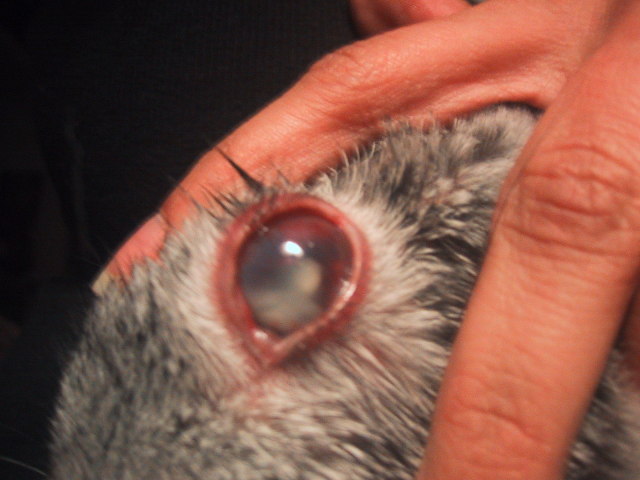 Tinkerbell's Cloudy Ey
Tinkerbell's Cloudy Ey
QUESTION: Dana,
My rabbit has been having an eye problem for more than a month, and I am at a loss as to how to help her now. On the evening of September 17th, I noticed that she was slightly squinting with her left eye and, upon inspection, I saw that the white of her eye was a little bloodshot. We went to the vet the next day. Our vet stained the eye and ran other tests. The conclusion was that her eye was not scratched, there was no ulcer or glaucoma or conjunctivitis. Her teeth and the rest of her body seemed just fine. But the eye was red and the pupil was constricted.
She determined that it was likely uveitis, perhaps caused by trauma due to Tinkerbell's playful activity. She prescribed BNP with Dex (Neomycin and Polymyxin b Sulfates and Dexamethasone Ophthalmic Ointment) to be given twice a day for seven days. The medicine seemed to help right away, but it didn't actually fix to problem.
A few days after her BNP regimen, we noticed a graying area of Tinkerbell's brown iris just under the pupil and a sort of brightening of the iris just above the pupil that give it an orangish glow. In the white of her eye, in the area of an inflamed blood vessel that runs along the curve of her iris, there was a grayish spot that seemed to me to be slightly collapsed inward. By the time that we went to the vet the next day, September 30th, there was also what looked like a little white pus collecting at the top of her pupil.
Our vet assured me that the seemingly collapsed spot was not a scratch or ulcer. She suspected that the uveitis was not cured by the last regimen or that there could be some other problem that she was unable to uncover. She prescribed drops, a 1% Prednisolone Acetate Ophthalmic Suspension, to be applied three times a day for seven days. Tinkerbell got better: the discolorations went away, but we were still left with the aggravated blood vessels, the gray collapsed spot, the constricted pupil, and the constantly altering levels of squinting.
In the last three days, her eye has taken a dramatic and troubling turn for the worse. (I am attaching a photo of the current state of her eye.) At first, the area above her pupil brightened again--a much brighter orange. Then it turned more red, like a deep red as though you could almost see blood in her iris. White invaded her pupil, first in concentrated spots, then in a cloudy way. This cloud has basically taken over her entire eye in the last day, but she seems to be able to see out of it somehow. Yesterday morning she had major wetness on her cheek below her eye, but that was the only time. She was also really flinching with near-eye contact. I began giving her the BNP again yesterday because of the pain reliever in it, and Tinkerbell seems to really appreciate it.
We have wanted to take her to an ophthalmologist, but we just didn't have the funds to do it. We were recently able to borrow the money, but the local ophthalmologist is out of town, so we don't know when we might be able to get in to see him. I'm extremely concerned to say the least, and I know I can't get her to an eye specialist before Monday. I don't know what the problem is or if there is anything my local vet can do to help her, such as giving her antibiotics.
A few notes about Tinkerbell: She is a three-pound bunny that I believe is around three years old. She has free run over half of our house. Her appetite is fantastic, and she gets unlimited grass hay and limited pellets and veggies. She lives with two cats (one of which we recently found out has tapeworms), and our other bunny lives in the other half of the house is doing just fine. Throughout this ordeal, Tinkerbell has behaved almost completely normally, and the clues that she may not be feeling well have been subtle indeed.
Any information that you could give me would be very helpful. My vet does what she can, but she is admittedly not a rabbit expert. However, she has been working on expanding her knowledge and being as savvy as possible. And unlike most vets in our area, she is willing to see rabbits and offer whatever care she can even in off hours. I hope you can lead all of us in the right direction.
ANSWER: Dear Melissa,
The appointment with the veterinary ophthalmologist is a very good move, and I hope he will be able to determine what is going on. That the eye is painful does suggest that uveitis is a possibility, but that means only "inflammation of the uvea", and doesn't really tell us what's causing this. That could be anything from trauma to infection, and lots of things in between.
Because there appears to be pus in the eye, my concern would be that she has a molar root intruding into the eye socket, penetrating the eyeball from behind and introducing bacteria. This is more common in older rabbits, but dwarf rabbits and others with short faces also can have this problem due to abnormal dental morphology. You can read more here:
www.bio.miami.edu/hare/dental.html
and
www.bio.miami.edu/hare/sneezing.html
Unfortunately, this infection may not only destroy her retina, rendering her blind in that eye, but will also be painful as long as its causing inflammation of the uveal structures (iris, ciliary body, etc.) that can also refer to other structures in the eye. If she does become blind, and the eye remains painful, then the best option may be to enucleate (i.e., remove) the eye.
This sounds traumatic and major, and in a way it is. But I have had (and still have) several one-eyed rabbits, and they do just fine. I even have had completely *blind* rabbits who do very well, so Tinkerbell would have one up on them if she does lose the eye.
The main concern about enucleation in rabbits, though, is the presence of a very large venous sinus behind the eye, which can bleed like crazy if it's nicked. So the surgeon should be very aware of this, and take proper care not to damage the sinus. It will stop bleeding with pressure, but it's very bloody, and scary when it happens. So best to have a vet/veterinary ophthalmologist who is aware of this, and knows what to do (apply pressure!! don't try to suture! it's thin as wet tissue paper!) if the sinus does start to bleed.
I'm glad you'll be seeing the ophthalmologist on Monday, and hope that he can offer an alternative to enucleation. But be aware that this is what might happen, just so you don't listen to anyone about such nonsense as euthanasia, which would be utterly ridiculous, given the treatability of this problem via enucleation if it can't be resolved medically.
I hope this helps.
Good luck,
Dana
---------- FOLLOW-UP ----------
QUESTION: Thank you, Dana, for your last helpful response. It truly helped us to prepare for our visit to the ophthalmologist.
We ended up seeing a rabbit-savvy ophthalmologist who isn't local, but she was well worth the drive. Dr. Nelms determined that Tinkerbell has anterior uveitis secondary to some other cause: most likely pasteurella or perhaps e. cuniculi. (She assured us that the infection was completely within the eye and not caused by an intruding molar root, which has given us greater hope of avoiding enucleation.) Severe swelling led to a detached retina, so Tinkerbell is currently blind in her left eye, but there is a chance she may regain vision.
Tinkerbell is taking Baytril once a day (one-fourth of a 22.7mg tablet for twenty days). Three times daily she receives a drop of 0.3% Ofloxacin and a drop of 0.03% Flurbiprophen. Tinkerbell's improvement was immediate, but it has waned and perhaps regressed since her visit a week ago on November ninth.
Although I understand the topical Flurbiprophen to be an NSAID, I don't know that it is offering her enough pain relief. I am concerned that the pain is beginning to wear her down. Her appetite is still great, but her activity leads me to believe that she's spending lots of time sitting quietly in pain. She's doing pretty well, but she's just not herself, and I don't want her to take a dramatic turn for the worse due to pain. I also think that the stress of pain will slow her recovery.
Is there anything you would recommend for additional pain relief? (We have a tramadol prescription that our vet could help us share with her.) Do you think the Flurbiprofen ought to have been enough? Also, how common or likely is it for a pasteurella infection to only present itself in the eye?
Thanks again for all your help.
AnswerDear Melissa,
The eye is usually protected from bacterial infection, so I wonder if she may have had an injury that allowed this infection to enter. E. cuniculi is also a possibility, especially if there are characteristic lesions in the lens. If this is the case, then you might consider asking the vet about putting her on Panacur and/or ponazuril, as the eye is not the only area that E. cuniculi can damage (long term damage to the kidneys and central nervous system are also possible, and nipping this in the bud could be wise).
Ask the vet about metacam, if she thinks it's okay to give oral meds along with the topical NSAID. If bun is really miserable, then Banamine (flunixin meglumine) is the best, especially if combined with a low dose of Tramadol.
You might also ask about atropine. Although most rabbits have atropinase that will destroy this drug rather quickly, it can still offer temporary relief if the pain is partly due to intra-ocular muscle spasms.
I hope this helps, and I'm very glad you found a great ophthalmologist to help you!
Dana


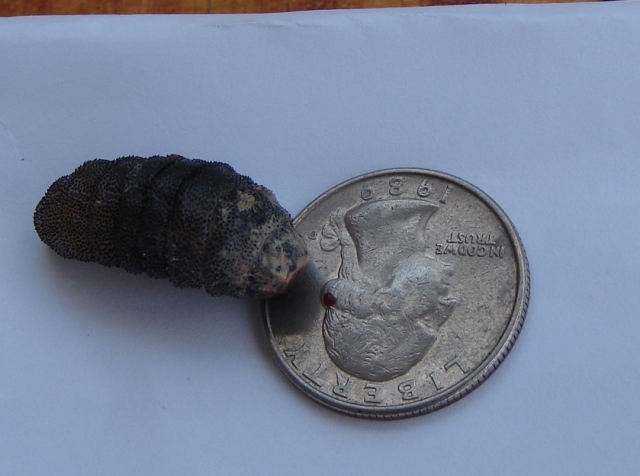 sick wild bunny
Question
warble
2 nights ago the motion sensor light ca
sick wild bunny
Question
warble
2 nights ago the motion sensor light ca
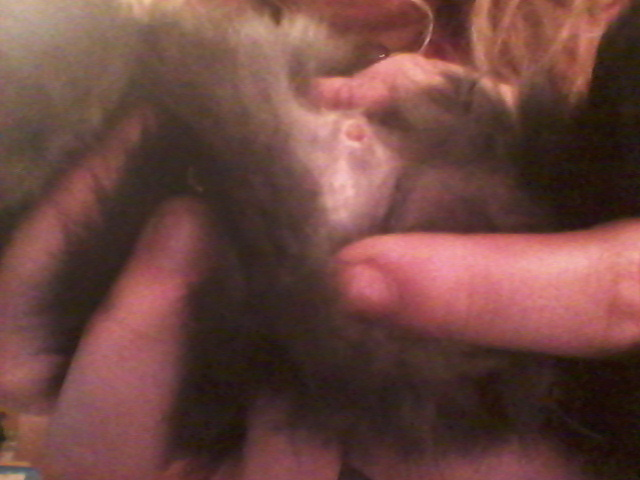 Lump?
Question
lump
So I bought a holland lop from a p
Lump?
Question
lump
So I bought a holland lop from a p
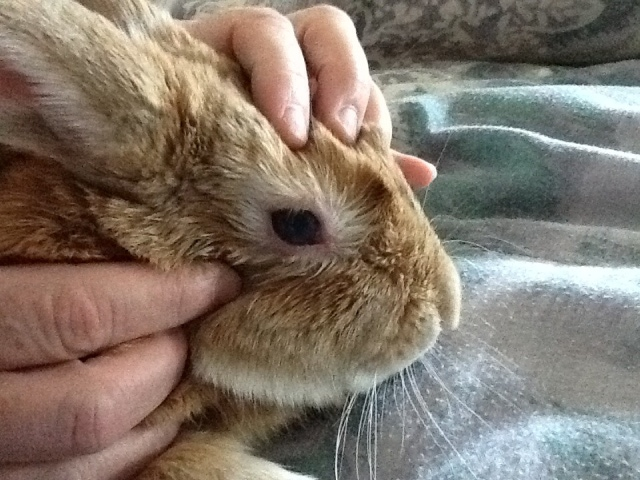 Bunny Eye
Question
Bentleys eye
Our 7 month old bunny Bent
Bunny Eye
Question
Bentleys eye
Our 7 month old bunny Bent
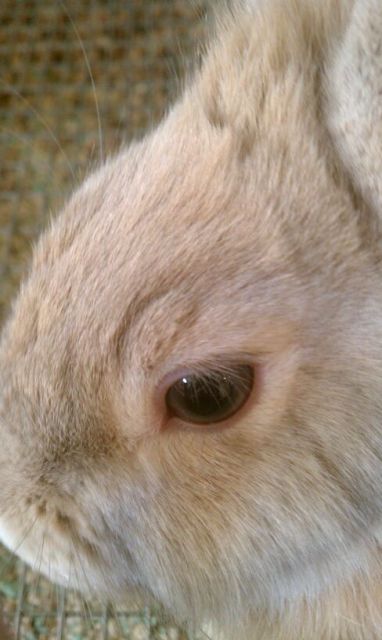 My male rabbit has attitude!
Question
The boy in question...
Hello and thanks
My male rabbit has attitude!
Question
The boy in question...
Hello and thanks
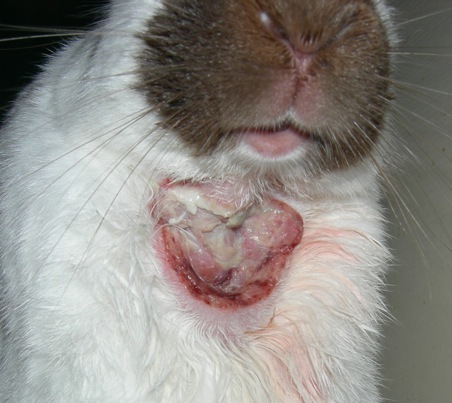 Huge Sore on Rabbits neck, Rabbit keeps biting it.
Question
Sore Picture
Months ago my rabbit had a little
Huge Sore on Rabbits neck, Rabbit keeps biting it.
Question
Sore Picture
Months ago my rabbit had a little